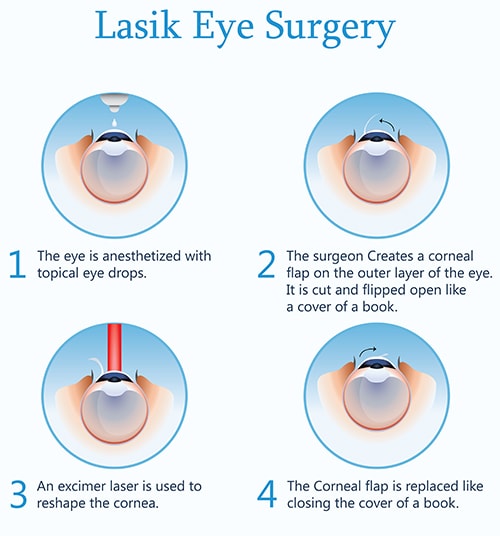
If you start each day by looking in the mirror trying to picture yourself without those horn-framed eyeglasses, constantly misplace your prescription shades, are tired of poking yourself in the eye with contact lenses each morning – you may be considering laser vision correction.
Ever since its FDA approval in 1999, LASIK has been very popular. It corrects nearsightedness (myopia), farsightedness (hyperopia), and astigmatism (an irregularly shaped cornea) by changing the cornea’s shape. Also known as refractive surgery, laser eye surgery changes how the patient’s eye refracts light, improving their vision.
Before your LASIK procedure, make sure you have a consultation with the LASIK surgeon. There are a few things you should ask during your consultation to ensure you’re receiving the best care.
1. Am I a Good LASIK Candidate?
Unfortunately, not everyone makes a good LASIK patient. Some people have eye conditions that will prevent them from having a LASIK procedure. to be a good candidate, you should have generally good eye health, sufficient corneal tissue for reshaping, and no current eye diseases, such as cataracts or glaucoma.
People who have diabetes or anyone who is HIV positive should not have the surgery. If you have a medical condition, consult with your physician before having any medical procedure.
Your potential eye surgeon should go over your medical history with you to determine if you’re a good LASIK candidate.

2. How Many Times Has the Doctor Done a LASIK Procedure?
LASIK vision correction surgery is, as the name implies, a surgery. Just as you wouldn’t want a podiatrist to handle your heart attack, you don’t want just any eye doctor to handle your LASIK surgery.
Just because you walk into an eye center with a particular doctor’s name on it does not mean that that doctor will treat you. Ask which ophthalmologist will operate on you and their qualifications.
3. How much does LASIK cost?
Most insurance companies won’t cover LASIK as it’s an elective procedure. Sometimes surgeries can have hidden costs. The estimate your doctor gives you should include the procedure itself, any necessary preparation, preoperative exams, surgery center fees, and any necessary medication. Also, check if the office offers financing options.
If there were to be a problem, does the doctor charge for retreatment?
Check with your insurance company to see if they will cover your expenses should anything go wrong. Not all insurance will cover you from complications after elective surgery.
4. What Are LASIK Side Effects?
All medical procedures have side effects. Dry eye is a common side effect after LASIK surgery.
You may also see halos after surgery. When you look at something bright, you may see a circle around it for a few days following your procedure. This is called the halo effect; it happens because fluid is building in your cornea as part of the natural healing process. It is nothing to be concerned about and only lasts for a few weeks.
Your surgeon should be upfront with you about all possible side effects so you’re making a fully-informed decision. To decrease your risk of side effects, make sure to follow all pre- and post-operative instructions from your surgeon.
5. What will my vision be after LASIK?
Chances are, you will not be able to see perfectly after LASIK surgery. The procedure generally corrects vision to 20/40. If you want to get rid of your glasses, LASIK surgery will help. If you’re going to pilot an airplane, the surgery won’t help.
At Assil Gaur Eye Institute, we offer EagleVision, the latest generation of LASIK. Our patients often leave with better than 20/20 vision!
6. How Much Does LASIK Hurt?
LASIK surgery is practically pain-free. The doctor numbs your eyes before the procedure begins. Some patients feel pressure on their eyes during the surgery, but any pressure that you feel will only last a couple of seconds.
7. What is the LASIK Procedure?
There are five parts to LASIK. Each eye goes through the same process.
- The doctor gives you eye drops and administers any anesthesia.
- The first laser creates a corneal flap.
- The second laser reshapes the cornea.
- The flap is put back in place.
- The process is repeated in the other eye.
LASIK surgery only takes about 15 minutes for both eyes.
8. Will Lasik Prevent Me from Pursuing the Career I Want?
Some careers prohibit refractive procedures.
You will not be able to join the police force if you have had LASIK. Professional athletes, coaches, and gym teachers are generally discouraged from having the surgery because of potential injuries to the eye. If a person or object hits the eye, it can dislodge the flap.
While doctors often recommend PRK for athletes, with Assil Gaur Eye Institute’s latest-generation EagleVision LASIK, the best LASIK surgeons have created a procedure that’s beloved by all sorts of athletes!
9. What is the LASIK recovery time?
Any surgery comes with some downtime. Blurry vision may prevent you from working or driving for a few days after surgery. Your eyes will take several weeks to several months to heal completely.
Most people can resume normal activities the next day.
10. Is Age a Factor?
Most doctors think LASIK surgery is best performed on people between the ages of 25 and 40. People under 25 often change prescriptions because their eyes are not fully mature.
If you are over 40, you are likely to need reading glasses. LASIK does not correct the vision problems that come naturally with age. You can still get the surgery if you are healthy, but glasses will be necessary in some cases.
The Bottom Line
LASIK eye surgery is a great solution to the annoyance and inconvenience of glasses and contact lenses. If you’re interested in improving your vision, schedule your consultation today! (And don’t forget to ask these important questions.)
Choose Assil Gaur Eye Institute for your LASIK vision correction
At AGEI, you will experience state-of-the-art ophthalmology that brings revolutionary technologies together with experienced, board-certified vision care professionals. Our goal is to help you achieve your best possible vision with our eye care.
Please call 866-945-2745 or visit us here to make an appointment online. If you are experiencing any concerning symptoms or require immediate eye care, contact us immediately to determine the best time to schedule an exam.
At Assil Gaur Eye Institute we take our patients’ safety seriously. Our facility’s Covid-19 patient safety procedures exceed all of the CDC’s coronavirus pandemic recommendations. Masks are required in our institutes at all times.
We are conveniently located for patients throughout Southern California and the Los Angeles area at locations in or near Beverly Hills, Santa Monica, West Los Angeles, West Hollywood, Culver City, Hollywood, Venice, Marina del Rey, Malibu, Manhattan Beach, and Downtown Los Angeles.
- Can You Go Blind from LASIK? What Are the Actual Odds? - 12/18/2023
- Eyesight Problems Linked to Dementia: What That Means For You - 08/22/2023
- 10 Lasik Consultation Questions You Have to Ask - 01/18/2022














